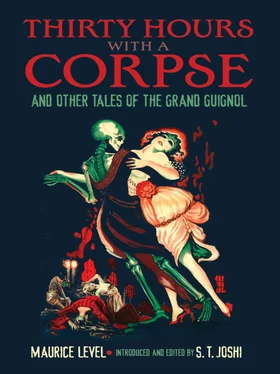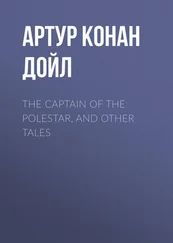He had decided, but he was sobbing:
“Oh, mother mother… What have you done!…”
It was goodbye to the quiet home life, the daily return to a house made sacred by memories; he could not, must not, had not the right to carry on the lie.
As he sat down, lost in his sad thoughts, a sound came from the dining-room.
“Poor boy… He feels it so keenly… He is in his mother’s room… Let him stay there if he wants to… How it has changed our lives… I feel as if I have grown old, old. Thank God I still have him. He is a good boy; he won’t leave me.”
He raised his head, biting his lips. The father went on talking, and as he listened his thoughts went off in another direction. The course on which he had decided seemed less easy, his duty not so clear.
“He won’t leave me…”
Had he the right to abandon this poor soul, to leave him to grow old alone in a deserted home?… To go away—was that all he could do to repay his unfailing kindness, his efforts for him, his self-denial?
But he was not his son… His presence under his roof had in it something intolerable, odious… Yet he must decide at once; if he hesitated it would be too late.
He was still holding his mother’s letter. He went on reading it:
“The slightest thing would have given me that energy: a suspicion… a harsh word… But there has never been anything… not a cloud…”
Behind the partition, the voice of the father was saying: “Yes, I have lived twenty-seven years with her, and during the whole of that time there was never a cloud…”
The same words… the same phrase… He went back to the letter:
“And now I am going to tell you the name of your real father. It is…”
The paper trembled in his fingers. If he turned the page the name would be forever engraved in his eyes, in the depth of his being… and then… he could no longer…
The voice called gently:
“Come along, dear lad, dinner is waiting on the table…”
He drew back his head and shut his eyes for a second. Then he took a match, raised his arm, and set fire to the paper. He watched it burn slowly, and when the flame got down to his nails, he opened his fingers. A square of black ash fell on the floor. A little white corner burnt itself out… Nothing was left…
He opened the dining-room door, looked for a moment at the good man who stood waiting for him, the mild face full of affection, the eyelids swollen, the hands tremulous—and with a gesture like that of a child, he flung his arms round the stooping shoulders as one might embrace a beloved being they had imagined they would never see again. And there was a catch in his voice that sounded like a sob as he said:
“Father! My dear old father!”
CERTAINLY THIS Jean Gautet did not look like a dangerous criminal.
He was a sickly little being of uncertain age with an air of premature suffering. The eyes that wandered about behind the spectacles which from time to time he adjusted on his nose with a quick movement were quiet and mild; he had the look of a child who fears being scolded rather than that of an assassin.
But arrested a few hours after he had committed the crime, he had not even attempted to defend himself, had confessed the moment the policeman laid a hand on his arm. Since then he had taken refuge in almost complete silence.
“Why don’t you explain your action?” said the judge at length. “Seeing you declare you did not know your victim, seeing you did not steal anything from his house, why did you kill him?”
“For nothing…”
“You must have had a reason… No one goes to a man’s house and drives a knife into him without a motive… Why did you do it?”
“For nothing…”
“Had he harmed you in any way?…”
This time he flinched, lowered his eyes, made a vague gesture and murmured:
“No…”
But suddenly changing his tone, he added:
“Well, yes!… It wasn’t for nothing… There was a reason… If I have kept silent all this time it is because I didn’t explain at first, and it was hard to do it afterwards… Some confessions are very difficult to make…
“I am an illegitimate child. My mother had to work very hard to keep me. I had a joyless childhood… Too many tears were shed in my home. At school they called me the ‘Bastard.’ I didn’t understand, but I soon found it meant something very sad, for when I asked my mother about it she hid her face in her hands and cried. Instinctively I avoided using the word again. She never complained and never told me her story till she lay on her deathbed… I was then fourteen years old.
“At fourteen I found myself alone in the world, without relatives, without friends, tired of life before I had begun to live.
“Just at first it was not so hard. I found a place where they fed me and gave me a bed. From time to time they gave me old clothes. The years passed… When I was twenty I became dependent on myself, and then I learned what poverty meant… For two years I had to keep myself entirely on a pound a week, and as I wasn’t a laborer—I was a clerk in a wholesale house—it was necessary for me to be properly dressed… To get clothes I had to economize in what I spent on food. I could only afford one meal a day—and there was very little of that… Sometimes I became faint and giddy in the streets, had to lean against a wall to keep myself from falling… hunger, of course…
“One morning when I got to the office, my employer said to me:
“‘I am not pleased with the way you are doing your work. For some time you have been making mistakes. You don’t seem to concentrate on what you are doing… Then you are careless about your appearance, and I don’t like that. My clerks must look neat and respectable.’ He touched the frayed revers of my coat. ‘That’s not the way to come to this office.’
“I tried to make excuses, but he wouldn’t listen.
“‘Nonsense! A man need never be ragged.’
“The other clerks were coming and going as he spoke, and I felt the blood rush to my head at the thought that they might hear…
“That day I had nothing at all to eat.
“When the stomach is empty, the brain works. The tears kept coming into my eyes as I bent over my desk. I wept from hunger and shame, and as I sat there in despair there came to me for the first time the idea that I could not be alone in the world seeing that my father was still alive. After all, I had a father. The thought comforted me and strengthened me. I resolved to go and find him. I would explain my position to him. He was rich, and he would be sure to help me when he knew my circumstances. Was I not his son?
“Next day I rang his bell. I felt almost tenderly disposed toward him. He was a little bowed old man with a pallid face and shuffling walk; everything about him showed he was ill, worn out. He said:
“‘Who are you? What do you want?’
“The tone of his voice froze me. I stammered as I tried to explain the object of my visit. But hardly had I begun when, trembling, he interrupted me.
“‘Not so loud… Lower your voice… Someone may hear…’
“He got rid of me as quickly as possible, pushing me toward the door with vague words.
“‘Leave me your address… I will see what I can do for you… Yes… I will see… I am ill… I will write to you…’
“I went home trying to collect my ideas.
“I waited a whole week; he made no sign. I dared not go back to him, fearing I might upset him again. I told myself he could never let me die of hunger. I took to walking near his house. As far as I could without letting them guess my secret, I got the neighbors to talk.
“‘Oh!’ said one of them, ‘if you are hoping to move him in any way, you’d better give it up at once… He has no more heart than a paving-stone. In any case, his money won’t be of any use to him much longer. He is so ill he can hardly drag himself about…’
Читать дальше












